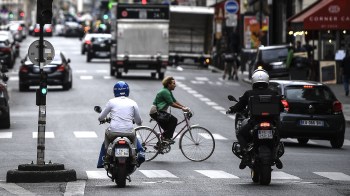Zipcar moves into D.C.’s public sector
TEXT OF STORY
Kai Ryssdal: In a lot of big cities around the country having a car can be more trouble than it’s worth. What with parking, insurance, maintenance and the rest. A company called Zipcar took that as a challenge and came up with a car-sharing business model. Instead of having their own, Zipcar members rent one for a couple of hours to run errands. This week Zipcar moved into the public sector, offering its services and technology to cities and local governments. Washington DC is the first to try it out, as Tamara Keith reports.
TAMARA KEITH: Washington, D.C., has about 1,600 passenger cars in its fleet. City workers making inspections or assessments use them. And Deputy Mayor Dan Tangherlini says they spend a lot of time sitting in parking lots.
DAN TANGHERLINI: Just looking at the amount of hours that those cars are actually used, you find that we’re paying for a lot of capacity that we’re just not using.
So, D.C. is trying out the car-share concept. The city is removing about 360 vehicles from its fleet and replacing them with just 60 others equipped with Zipcar technology. Tangherlini says city workers reserve cars over the Web and then use a keycard to unlock them.
TANGHERLINI: The keys are in the car, the car is fueled, you’ll take it where you’re supposed to go and bring it back when you say you’ll have it back.
Tangherlini says this system will save about $6 million over the next five years. Zipcar’s CEO Scott Griffith says he’s talking to another 15 cities about doing the same thing.
If you have a smart scheduling system and a self-service access mechanism, and you apply that to these government fleets, then you can downsize the amount of cars that governments need to serve the exact same population of users.
It’s a case of technology developed in the private sector helping out the public sector, says Robert Fuentes, a Senior Fellow at the Brookings Institution.
TANGHERLINI: As these budgets are tighter they’re looking for any ways for saving, and I think this is a great idea.
But not so good for car sales.
In Washington, I’m Tamara Keith for Marketplace.
There’s a lot happening in the world. Through it all, Marketplace is here for you.
You rely on Marketplace to break down the world’s events and tell you how it affects you in a fact-based, approachable way. We rely on your financial support to keep making that possible.
Your donation today powers the independent journalism that you rely on. For just $5/month, you can help sustain Marketplace so we can keep reporting on the things that matter to you.


















